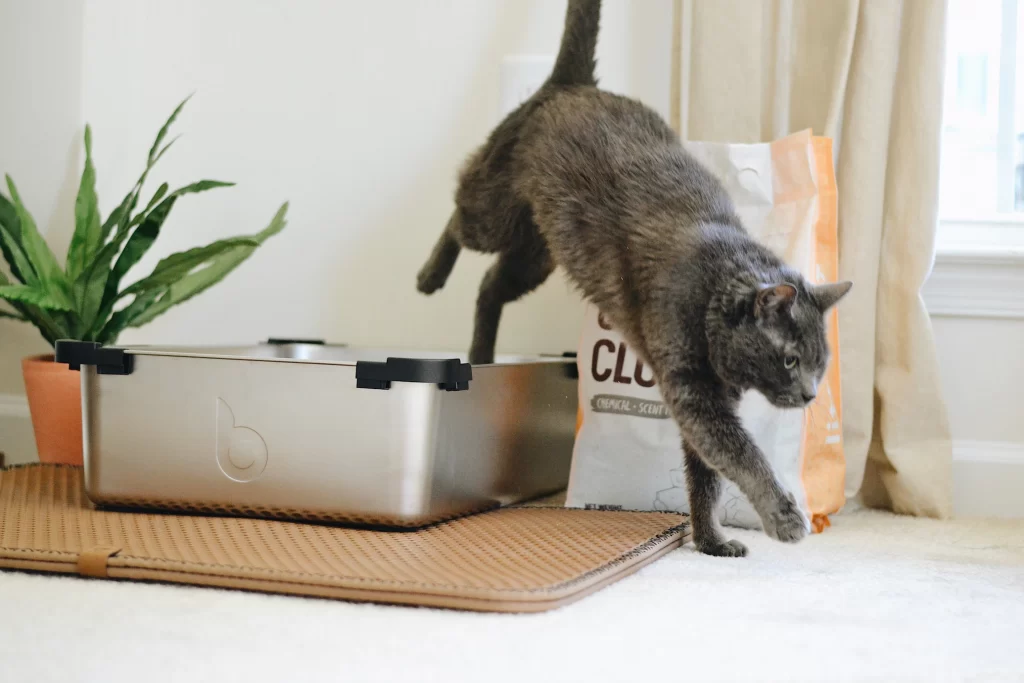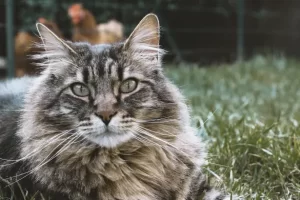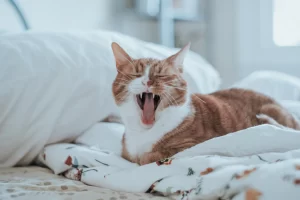Last updated on February 13th, 2023 at 02:55 am

Are you wondering why your cat has stopped using the litter box? Cats stop using their litter boxes for a variety of reasons, including difficulties with the box or the litter, dissatisfaction with the placement or quantity of boxes, changes in the environment within or outside the house, and undiagnosed medical concerns.
It is crucial to remember that cats do not intentionally defecate outside of their litter box to annoy their owners. Any penalty will not stop or change this behavior because the bulk of causes for litter box avoidance is stress related. Punishment makes the issue more stressful (for you and your cat) and makes determining the underlying cause more difficult. Here are some of the most common reasons your cat has stopped using the litter box.
Cats and Their Relationship with Cleanliness
According to most people, cats have the best hygiene of any animal kept as a pet in the home. This is because cats are quite particular about their hygiene and grooming, and they despise the concept of being unclean and loathe, emitting highly detectable odors. Because cats are intermediate predators, one of their fundamental instincts is to keep their appearance in good condition by grooming. They hunt prey that is smaller than themselves, yet they are aware that they are not at the top of the food chain.
This suggests that cats prefer not to be observed by other humans. Self-grooming actions are the major means by which cats achieve this. The cleaner a cat is, the less likely it is that it will emit an odor. As a result, predators find it difficult to track a cat’s movements. You’ll notice that both feral cats and wild cats have a clean appearance.
After pooping, a cat will bury any waste it generates in the litter. This, like grooming, is a basic instinct for ensuring one’s own survival. The cat does not want a potential predator to know it was in the vicinity, and any poop or urine residue can be a dead giveaway. If a cat eats a well-balanced diet, it should have solid feces that require less cleaning after passing. The cat has an unsanitary habit of cleaning its own bottom with its tongue.
So, if you notice that your cat isn’t using the litter, you should find out the reason as cats don’t normally do this because of their clean habits.
Common Reasons Why Your Cat Stopped Using Their Litter Box
Let’s take a look now at some of the most common reasons why your cat is not using their litter box anymore. We included a few solutions you can use too.
1. They Are Not Trained To Use Litter Boxes
Of course, this reason is not applicable if your cat already used one and then just stopped using it. However, let’s still include it so other new cat owners will know the importance of litter boxes. Some cats may never have been exposed to a litter box, so it’s possible they’ll never learn to use one. Maybe they didn’t see litter boxes when they are little or maybe they are adopted stray cats. Cats are relatively easy to train because they have a built-in tendency to hide their waste. Put the cat near the box, but not inside it, and wait fifteen to twenty minutes after he has completed eating or playing. We can only hope that he will take the initiative to look into it on his own. Reward him with praise after he uses it and keep at it until he consistently makes use of his box on his own.
2. The Litter Box Is Dirty
Who wants to use a dirty bathroom, right? If you don’t scoop the litter box daily and totally replace all of the litter once every seven days, your cat may be trying to tell you something. Why should we expect cats to use a dirty litter box when we wouldn’t want to use a dirty bathroom? You need to do your best to keep the litter box clean.
Cluttered litter boxes are a common problem, especially in households with many cats. If you want to make sure you remember to clear out the box every morning and night, placing a bucket and scoop in close proximity to the box might serve as a helpful visual reminder. Remember, scooped litter should be disposed of in a trash bag or covered trash bin to keep unwanted odors from spreading outside the litter box.
3. Your Feline Friend Doesn’t Want The Cat Litter You Used
Our feline friends don’t always share our enthusiasm for novelties like “clumping,” “flushable,” and “scented” litter. When it comes to litter, every cat has their own personal preference. If your cat stops using the litter box suddenly after you’ve switched brands of litter, this is maybe because they don’t want the litter you used. If you’re not sure if your cat likes the litter you’re using, here’s an easy experiment you can do:
- Keep the two boxes near together and monitor which one your cat prefers.
- If your cat prefers the new litter more often, you may choose to switch to it. If the new one isn’t working, try out a few different kinds until you discover one that does.
Remember, your cat will be the one to use the litter, so make sure that they like what they are going to use. Consider their preference more.
4. Changing Litter Brand Too Often
Some felines become disinterested in using the litter box if you constantly change the litter brand you are using. Cats are mostly picky and they prefer using the same brand and type of litter every time. Once you’ve determined which litter brand and kind your cat prefers, it’s important to stick with them consistently. Mix equal parts of the old and new litter in the box for approximately a week while you transition to give your cat time to grow used to the new habit before making the switch entirely. Changing litter brands is just as same as changing cat foods, do it gradually.
5. Putting Too Much or Too Little Litter
It will be more difficult for your cat to properly cover his/her feces and urine if there is not enough litter in the box. Every time you scoop, the amount of litter in the container drops a little bit smaller, and this might become an issue if it is not replaced frequently. Another issue is putting too much amount of litter. You need to learn how to put the right amount. Litter can spill all over the floor when they dig and another problem will occur. Some cats will relieve themselves on the floor right next to the litter box if there is any litter that has fallen outside of the container.
In most cases, a depth of two to four inches is enough, but it is always advisable to follow the guidelines provided on the box or bag. While you are scooping the litter throughout the week, be sure to add some more litter so that it remains at the appropriate amount.
6. Your Cat Doesn’t Like The Litter Box Itself
It’s possible for cats to have quite specific requirements for their litter box. Another possible explanation for why your cat does not use the litter box is that he does not like the type that you have purchased for him. There is a wide variety of boxes available, and it is essential that you select one that is suitable for your feline friend.
When choosing a litter box, it is important to take into account your cat’s size, how mobile it is, and where you intend to put the box. Some cats do not want to be contained in boxes that are covered or enclosed because they believe it makes them feel too constrained. Additionally, they have a propensity to trap scents. If you’re currently utilizing a covered box, but it’s not working out for you, you might want to look into obtaining an open-style one instead.
When they step out of the box, some litter may fall outside of it, but if you place a big mat beneath the box, most of the litter will be contained. Open containers make it simple to scoop out soiled litter, restock, and maintain a clean environment.
7. They Can Smell Their Poops and Urine All Over The House
Cat has a very keen sense of smell and territory. If your cat is able to detect the scent of the places in your home where he/she has previously defecated, he may decide that those spots are appropriate locations for him/her to do so again. Thoroughly cleaning these places is an important step in finding a solution to the problem. The following are some recommendations for cleaning up after your cat.
- For areas with hard surfaces, use the product you normally use for cleaning to give it a thorough cleaning. After that, wipe down the surface with a solution consisting of warm water and white vinegar in a ratio of 50/50 to help eliminate odors. Pet odor remover is also very good for eradicating any remnants of odors that may have been left behind after other methods have been used.
- Paper towels should be used to blot urine from carpet, carpets, and any other fabric materials until the pee has been completely absorbed. Do not massage, since this will make it more difficult to remove any scents.
- Use a gentle dish detergent and warm water to clean the surface, and then follow up with an enzymatic product designed to eliminate pet odors.
- After the material has had time to dry, you can prevent the cat from returning to the location by draping sheets of aluminium foil over it in a loose manner.
8. The Cat Doesn’t Like The Position of His/Her Litter
Cats are territorial and picky. Because cats are creatures of routine, you shouldn’t make a sudden change to where the litter box is kept. If you have to move a box from its usual spot, you should do so gradually so that your cat has time to acclimate to the new surroundings.
A location distant from your cat’s food and water bowls that are both peaceful and offer some degree of solitude should be chosen for the placement of the litter boxes. Steer clear of locations with a lot of foot traffic and noisy places like laundry facilities. It is possible that you will need to install baby gates or pet doors to section off the area containing the litter box in order to avoid unwanted incursions by other animals or by humans, particularly children.
9. Your Cat Might Have a Health Problem
It’s scary if your cat stops using the litter box all of a sudden, especially if he or she has always used it. A sick cat might not want to use the box if it hurts to do its business there. Cats are very good at hiding the signs that they are sick, so it’s up to you to notice any changes in your cat’s routine or behavior.
See a doctor or vet to make sure there are no health problems. The problem should be found and fixed as soon as possible. Once your cat gets better from his illness, he will probably go back to using the litter box as usual.
Conclusion
It’s important to remember that if your cat has stopped using the litter box, you should never punish it for relieving itself in inappropriate places. Hitting a cat in an attempt to make it behave is a waste of time. No amount of teaching will make an impression on them. If you punish your cat for eliminating outside of the litter box, he will only associate that behavior with negative reinforcement and avoid doing it in the future.
To permanently solve the issue of your cat not using the litter box, you must first determine the reason(s) for this behavior and then address those causes. Always remember that there’s a reason for everything that takes place in your life and your cat’s life.
Also read:
7 Best Cat Litter Box Enclosures


